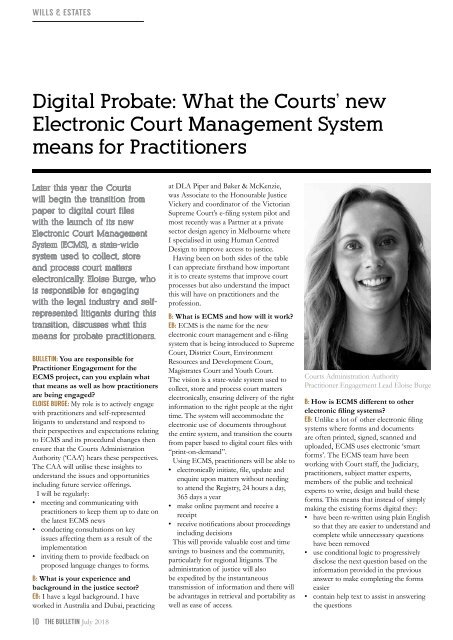LSB July 2018_Web
Create successful ePaper yourself
Turn your PDF publications into a flip-book with our unique Google optimized e-Paper software.
WILLS & ESTATES<br />
Digital Probate: What the Courts’ new<br />
Electronic Court Management System<br />
means for Practitioners<br />
Later this year the Courts<br />
will begin the transition from<br />
paper to digital court files<br />
with the launch of its new<br />
Electronic Court Management<br />
System (ECMS), a state-wide<br />
system used to collect, store<br />
and process court matters<br />
electronically. Eloise Burge, who<br />
is responsible for engaging<br />
with the legal industry and selfrepresented<br />
litigants during this<br />
transition, discusses what this<br />
means for probate practitioners.<br />
BULLETIN: You are responsible for<br />
Practitioner Engagement for the<br />
ECMS project, can you explain what<br />
that means as well as how practitioners<br />
are being engaged?<br />
ELOISE BURGE: My role is to actively engage<br />
with practitioners and self-represented<br />
litigants to understand and respond to<br />
their perspectives and expectations relating<br />
to ECMS and its procedural changes then<br />
ensure that the Courts Administration<br />
Authority (‘CAA’) hears these perspectives.<br />
The CAA will utilise these insights to<br />
understand the issues and opportunities<br />
including future service offerings.<br />
I will be regularly:<br />
• meeting and communicating with<br />
practitioners to keep them up to date on<br />
the latest ECMS news<br />
• conducting consultations on key<br />
issues affecting them as a result of the<br />
implementation<br />
• inviting them to provide feedback on<br />
proposed language changes to forms.<br />
B: What is your experience and<br />
background in the justice sector?<br />
EB: I have a legal background. I have<br />
worked in Australia and Dubai, practicing<br />
at DLA Piper and Baker & McKenzie,<br />
was Associate to the Honourable Justice<br />
Vickery and coordinator of the Victorian<br />
Supreme Court’s e-filing system pilot and<br />
most recently was a Partner at a private<br />
sector design agency in Melbourne where<br />
I specialised in using Human Centred<br />
Design to improve access to justice.<br />
Having been on both sides of the table<br />
I can appreciate firsthand how important<br />
it is to create systems that improve court<br />
processes but also understand the impact<br />
this will have on practitioners and the<br />
profession.<br />
B: What is ECMS and how will it work?<br />
EB: ECMS is the name for the new<br />
electronic court management and e-filing<br />
system that is being introduced to Supreme<br />
Court, District Court, Environment<br />
Resources and Development Court,<br />
Magistrates Court and Youth Court.<br />
The vision is a state-wide system used to<br />
collect, store and process court matters<br />
electronically, ensuring delivery of the right<br />
information to the right people at the right<br />
time. The system will accommodate the<br />
electronic use of documents throughout<br />
the entire system, and transition the courts<br />
from paper based to digital court files with<br />
“print-on-demand”.<br />
Using ECMS, practitioners will be able to<br />
• electronically initiate, file, update and<br />
enquire upon matters without needing<br />
to attend the Registry, 24 hours a day,<br />
365 days a year<br />
• make online payment and receive a<br />
receipt<br />
• receive notifications about proceedings<br />
including decisions<br />
This will provide valuable cost and time<br />
savings to business and the community,<br />
particularly for regional litigants. The<br />
administration of justice will also<br />
be expedited by the instantaneous<br />
transmission of information and there will<br />
be advantages in retrieval and portability as<br />
well as ease of access.<br />
Courts Administration Authority<br />
Practitioner Engagement Lead Eloise Burge<br />
B: How is ECMS different to other<br />
electronic filing systems?<br />
EB: Unlike a lot of other electronic filing<br />
systems where forms and documents<br />
are often printed, signed, scanned and<br />
uploaded, ECMS uses electronic ‘smart<br />
forms’. The ECMS team have been<br />
working with Court staff, the Judiciary,<br />
practitioners, subject matter experts,<br />
members of the public and technical<br />
experts to write, design and build these<br />
forms. This means that instead of simply<br />
making the existing forms digital they:<br />
• have been re-written using plain English<br />
so that they are easier to understand and<br />
complete while unnecessary questions<br />
have been removed<br />
• use conditional logic to progressively<br />
disclose the next question based on the<br />
information provided in the previous<br />
answer to make completing the forms<br />
easier<br />
• contain help text to assist in answering<br />
the questions<br />
10<br />
THE BULLETIN <strong>July</strong> <strong>2018</strong>


















